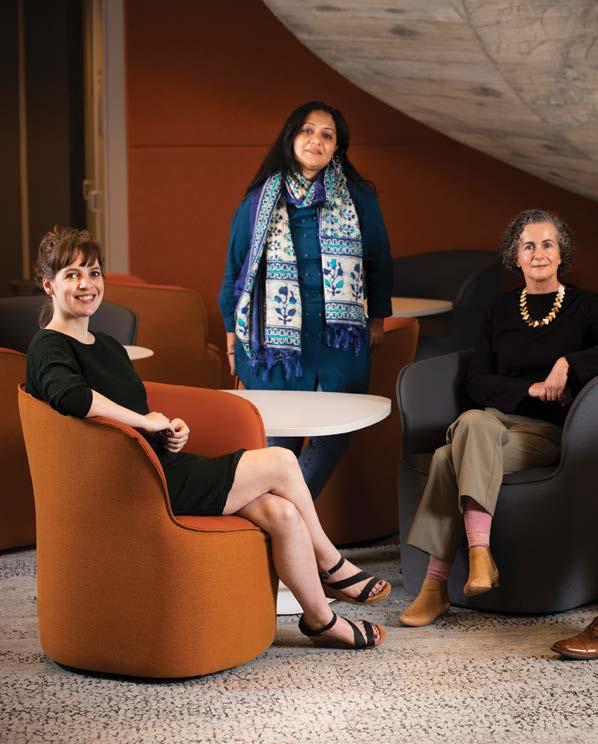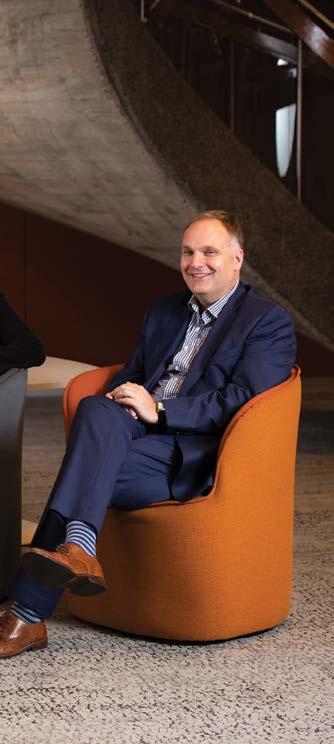
5 minute read
Sustainability
18
ETHICAL ACCOUNTABILITY

19
INSPIRING TOMORROW’S RESPONSIBLE LEADERS
A passionate team of Monash Business School lecturers is challenging students to think beyond performance and growth as the only measures of business success.
Dr Laura Visser and her colleagues Dr Fahreen Alamgir, Associate Professor Michelle Greenwood, Professor Gavin Jack, Dr Susan Mayson, Professor Kathleen Riach, and Professor Julie Wolfram Cox, share a common goal – to inspire students to appreciate the importance of responsible leadership. “Performance and growth remain the primary focus of most management studies, but we know that focusing on these two things at the exclusion of wellbeing or the consideration of other outcomes creates a lot of issues - for example, environmental issues and issues of inequality,” Dr Visser says. “We encourage our students to think beyond the normal assumptions of how organisations should operate, to consider the negative impact of these practices on people and the environment and to imagine radical alternatives.”
Dr Visser says their work exposes students to a range of alternative theories that explore the impact of organisational models on issues including gender, race, poverty, discrimination and the environment.
“Throughout our teaching there is an emphasis on ethical accountability,” she says. “We ask them to think about how current management methods may not serve what we want to achieve, or what we argue could be achieved.”
The team’s approach aligns with Monash Business School’s commitment to the United Nations Sustainable Development Goals (SDGs), which underpin the Principles for Responsible Management Education (PRME). They are inspired by a passion to shine a light on people who are marginalised or forgotten.
SUSTAINABILITY
DELIVERING ON SUSTAINABLE DEVELOPMENT GOALS
Monash Business School is working to achieve the United Nations Sustainable Development Goals across our education and research.
While the COVID-19 pandemic has posed significant challenges to all universities, it also provided many opportunities to reflect on our purpose and vision and set up a new strategic direction for the school.
Sustainable Development Goals (SDGs) are at the core of this new purpose-driven strategy. Our research across multiple SDGs remains a success, with a new research centre focused on climate change in the Pacific being established. Our alignment with Monash University’s strategic plan, Impact 2030, ensures we will continue to make achievement against SDGs a key measure of our success.
1. NO POVERTY
Researchers from the Department of Accounting have undertaken a year-long field study to develop a social impact framework for a national charity.
2. ZERO HUNGER
Education and training delivered by the school improved cooperative efforts by farmers in Laos to control rodent populations, leading to reduced loss of rice crops.
3. GOOD HEALTH & WELLBEING
Working with BRAC, an NGO in Bangladesh, our researchers gathered the first experimental evidence on the mental health benefits of play for children and mothers living in Rohingya refugee camps.
7. AFFORDABLE & CLEAN ENERGY
Researchers from the Department of Econometrics and Business Statistics developed an algorithm for long-term electricity forecasting for the Australian Energy Market Operator.
13. CLIMATE ACTION
We have examined the impact of pollution from coal–fired power units on the anaemic status of children and women in India.
8. DECENT HEALTH & ECONOMIC GROWTH
Launched in 2021, the Modern Slavery Disclosure (MSD) scoring framework is designed by the Monash Centre for Financial Studies (MCFS) as a benchmark for the disclosure quality of slavery reporting statements.
14. LIFE BELOW WATER
Our researchers established movement patterns for triton snails, using acoustic telemetry data, to better understand how snails contribute to conservation through starfish predation on the Great Barrier Reef.
9. INDUSTRY, INNOVATION & INFRASTRUCTURE
Researchers in the Centre for Development Economics and Sustainability use high-frequency and high spatial resolution data to track pollution along major highways linking two Chinese cities.
15. LIFE ON LAND
As part of Monash University’s Fire to Flourish program, we research the impact of wildfires drawing on longitudinal subjective well-being data.
20
4. QUALITY EDUCATION
Our economists are utilising historical data to show the impact of forced migration on attitudes to education, and to help policy-makers better support refugee access to education.
10. REDUCED INEQUALITIES
The Department of Management’s research into autism employment practices has enabled a globally accessible research-based toolkit to support inclusive workspaces.
16. PEACE, JUSTICE & STRONG INSTITUTIONS
We teach about the importance of environmental, social and governance issues across our suite of undergraduate and graduate courses, including the bespoke Master of Regulation and Compliance.
5. GENDER EQUALITY
We are researching retirement, wellbeing, and psychological outcomes for women.
11. SUSTAINABLE CITIES & COMMUNITIES
We examine the social and behavioural factors that lead to open dumping of trash and test potential solutions to curb this problem.
17. PARTNERSHIPS FOR THE GOALS
Monash Business School leads the partnership between Monash University and Fiji National University, to establish the Pacific Action on Climate Transitions (PACT) research centre.
6. CLEAN WATER & SANITATION
Researchers developed a dynamic portfolio model of water consumption and supply, showing that people adopting water-saving behaviour when they know reservoirs are low would better allow governments to effectively manage risks to water resources.
12. RESPONSIBLE CONSUMPTION & PRODUCTION
Our Department of Marketing has hosted industry breakfast events on delivering business sustainability, featuring speakers from a range of national companies and sectors.
21
Professor Dominique Allen
TACKLING DISCRIMINATION IN ITS MANY GUISES
With her work driving more power to the victim, Associate Professor Dominique Allen’s handson approach to research is making Australian equality law more effective. As Director of Monash Business School’s Labour, Equality and Human Rights research group within the Department of Business Law and Taxation, A/Professor Allen says Australian discrimination law is ineffective in achieving equality because it operates retrospectively and relies on the victim to take action.
“If a person is denied access to a building due to their disability, the courts may compensate that individual, but they are very unlikely to fix the bigger problem and order the business to make the building accessible,” she says. Her wide-ranging research has tackled the enforcement of anti-discrimination law, the impact of COVID-19 on workers with family responsibilities, pregnancy discrimination in the workplace and the role of Alternative Dispute Resolution in resolving legal disputes. Her latest research project focuses on women’s experiences using Victoria’s anti-discrimination laws, specifically around pregnancy and the workplace. Dr Allen takes a hands-on approach to her research, interviewing lawyers, tribunal members and staff at statutory equality agencies about their experiences in dealing with these issues. “I do this in order to gather evidence about how the law is working ‘on the ground’ so that the law reforms I propose are realistic and achievable,” she says.









